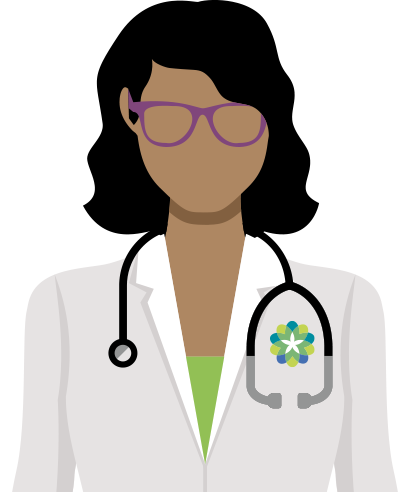|
Recognizing the vital link between nutrition and health, ChristianaCare and community partners connect vulnerable patients to healthy food and nutrition education.
(WILMINGTON, Del. – March 12, 2024)
To improve overall health and reduce health disparities throughout the communities it serves, ChristianaCare is expanding its efforts in Delaware and Maryland to provide home delivery of healthy foods for patients managing chronic health conditions.
 Downloadable Assets Downloadable Assets
Through ChristianaCare’s Delaware Food Farmacy program in Delaware and Healthy Food, Healthy Hearts program in Cecil County, Maryland, more than 300 people with chronic health conditions have an opportunity to improve their health through tailored home deliveries of food, paired with nutrition education and social care services.
“Our focus is empowering people to maintain their health by giving them the resources they need for whole-person care, including healthy food and education related to meal preparation and living with a chronic health condition,” said Erin Booker, LPC, chief biopsychosocial officer for ChristianaCare.
“Through our work with our community partners in the Food Farmacy program in Delaware and our Healthy Food, Healthy Hearts program in Cecil County, Maryland, we are acknowledging the intersection of nutrition and health care and the importance of creating a more equitable food system.”
Food is Medicine
ChristianaCare’s food delivery programs operate on the “food is medicine” model, which recognizes that nutritious foods are essential for good health – and they must be accessible in the community, particularly in under-resourced areas.
Studies have shown that evidence-based, tailored food interventions can lead to improved health outcomes and better use of health care services among participants while also reducing food insecurity, said Michelle L. Axe, MS, CHES, program manager of Food and Social Care Initiatives for ChristianaCare.
Delaware Food Farmacy and Healthy Food, Healthy Hearts also include access to community health workers and patient care coordinators who work individually with patients to help them meet other social care needs, offering another opportunity to meet patients where they are.
“With these programs, we’re offering participants an opportunity to make a change in their life, not only for them as individuals, but for the entire family,” Axe said. “This is about more than food.”
Delaware Food Farmacy
Delaware Food Farmacy, a partnership with Lutheran Community Services, provides participants with weekly deliveries of locally sourced produce, meat and other foods, along with one-on-one support from a community health worker who can offer assistance with healthy cooking techniques, making better choices at the grocery store and navigating the challenges of living with a chronic illness.
Since 2021, the program has been open to referrals from providers for Medicaid-eligible patients with uncontrolled hypertension, diabetes and congestive heart failure. Over the past two years, Delaware Food Farmacy has helped more than 200 participants – and their families – improve their health through the foods they consume, resulting in lower blood glucose levels, weight loss and improved blood pressure.
Among Food Farmacy graduates, 26% report a decrease in food insecurity and 18% said they experience less anxiety.
“Providing food – that’s our core competency,” said Rob Gurnee, executive director of Lutheran Community Services. “What really makes this program different and incredibly valuable is that ChristianaCare can funnel the right people into the program and then maintain these relationships to help patients make changes that are sustainable. Together, we utilize the strengths of our organizations with the goal of improving health outcomes.”
Success Brings Expansion
As a result of this success, Delaware Food Farmacy is expanding its program in 2024 to include pregnant patients at the Center for Women’s & Children’s Health who are Medicaid-eligible and at increased risk for serious preterm health complications.
“Many studies have shown that eating a healthy diet, particularly early in pregnancy, leads to lower rates of preterm birth and preeclampsia. We know that about 20% of our pregnant moms report food insecurity,” said Matthew Hoffman, M.D., MPH., Marie E. Pinizzotto, M.D., endowed chair of Obstetrics and Gynecology for ChristianaCare. “This program lets us bridge this gap and support our patients and their families.”
Additionally, a 2023 grant from the Highmark Delaware BluePrints Program is enabling the program to be more culturally responsive to the Hispanic community – who make up 18% of ChristianaCare’s patient population – by providing updated and translated program messaging, recipes, cooking videos, and menu adaptations.
“What is exciting for me is to be able to teach people that they can enjoy their food and their culture and still live healthier lives,” said Michelle Torres, a community health worker with Delaware Food Farmacy. “And by doing that, they can teach their children and their children’s children.”
Healthy Food, Healthy Hearts
In Maryland, ChristianaCare has partnered with Hungry Harvest, an online grocer that works with farmers to promote healthy eating and avoid waste.
Since September 2023, more than 100 Maryland Primary Care Program (MDPCP) patients have participated in the 12-week program that delivers fresh groceries to under-resourced Medicare patients with complex health needs. Participants go online and select from healthy options that are delivered to their door.
“With this population, they don’t have the money to purchase healthy foods. And they don’t always know what’s healthy. It’s good that we have that guidance where we can go and say, ‘Well, this is healthy for you,’” said Bethany Coyle, a patient care coordinator who works at ChristianaCare Primary Care at Elkton. “It takes that burden of grocery shopping and lessens it for them.”
ChristianaCare’s food as medicine program is made possible through federal funding, a grant from the Highmark Blue Cross Blue Shield Delaware BluePrints for the Community and an ongoing financial commitment from ChristianaCare.
 |
|
Need an expert source?
Our Experts, ChristianaCare's expert database, can help you find the right source for your next news story.
Request an interview ➜ |
|
About ChristianaCare
Headquartered in Wilmington, Delaware, ChristianaCare is one of the country’s most dynamic health care organizations, centered on improving health outcomes, making high-quality care more accessible and lowering health care costs. ChristianaCare includes an extensive network of primary care and outpatient services, home health care, urgent care centers, three hospitals (1,430 beds), a freestanding emergency department, a Level I trauma center and a Level III neonatal intensive care unit, a comprehensive stroke center and regional centers of excellence in heart and vascular care, cancer care and women’s health. It also includes the pioneering Gene Editing Institute.
ChristianaCare is nationally recognized as a great place to work, rated by Forbes as the 2nd best health system for diversity and inclusion, and the 29th best health system to work for in the United States, and by IDG Computerworld as one of the nation’s Best Places to Work in IT. ChristianaCare is rated by Healthgrades as one of America’s 50 Best Hospitals and continually ranked among the nation’s best by U.S. News & World Report, Newsweek and other national quality ratings. ChristianaCare is a nonprofit teaching health system with more than 260 residents and fellows. With its groundbreaking Center for Virtual Health and a focus on population health and value-based care, ChristianaCare is shaping the future of health care.
####
|